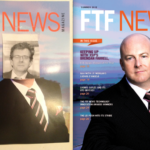Social Media Compliance refers to conformance with regulations governing investors’ safety when securities firms are using social media websites such as Facebook, LinkedIn and Twitter to publicize their services and offerings. The new rules for social media and financial services firms mainly ensure that employees are not exposing information that could put a firm at
Back-Office
Reconciliation Vendors Say Cheeeeese
This week, FTF held its 7th Annual Reconciliations & Exception Management Conference in New York City. The event was a great success with over 100 attendees and 10 sponsors. Take a look through some of the great companies that participated: Thanks again to our sponsors, speakers and delegates. We look forward to seeing everyone next
Guest Blog
Capital Markets and Expensive Errors
Guest Contributor: Joseph DiNardo, Senior Product Manager, Bonaire Software Many capital markets firms have been asking themselves the following: “How confident is my expense management team in the accuracy and validation of trade expense costs when paying vendor invoices?” – or – “Have we compared trade execution fees across vendors for optimal pricing?” These questions stem
What is series
“What Is” FACTA?
The Fair and Accurate Credit Transactions Act (FACTA) was established in order to protect consumers from identity theft by increasing accuracy, privacy and information sharing. FACTA was passed by the U.S. Congress as an amendment to the Fair Credit Reporting Act (FCRA) on November 22, 2003. A major reform, FACTA applies to every individual or
Guest Blog
Big Mistake Making Reconciliation Tool of Choice Excel
Guest Contributor: Neil Vernon, Product Development Director, Gresham Computing Gresham Computing is one of the sponsors of FTF’s 7th Annual Reconciliations & Exception Management Conference. When I looked through the list of sponsors there was one really noticeable omission. The vendor that supplies the software that undertakes the majority of reconciliations in every financial firm
What is series
“What Is” A Commodity?
A commodity is a raw material or agricultural product such as grains, gold, beef, oil and natural gas that can be widely bought and sold across global markets. In general, there are two types of commodities—hard and soft commodities, classified by their predicted life span. Hard commodities include iron, crude oil, gold and silver. Soft
Corporate Actions
What’s Different About These Pictures?
Some of the exhibitors at our 6th Annual Corporate Actions Processing event this past Wednesday, had a little fun with our Summer 2012 print issue (yes, you can have fun even when talking about corporate actions). Can you spot the difference?
Compliance
Can Cube or OLAP Technology Prove to be the New Disruptive Force in Risk Management Solutions?
Guest Contributor: By David Priestly, CEO of OpenLink’s CubeIntelligence Division Every so often, markets become dominated by so called “disruptive technology” solutions that offer a genuine order of magnitude improvement in functionality, speed, flexibility and cost. Cubes or OLAP (online analytical processing), which are the cornerstone of all good business intelligence platforms, are threatening traditional
Corporate Actions
“What Is” Cost Basis Reporting?
Cost Basis Reporting (CBR) is the process of identifying the cost of a security, particularly in terms of the rules and regulations implemented by the Internal Revenue Service (IRS). Recently, CBR via brokerages underwent major changes as of Jan. 1, 2011 as a result of the Emergency Economics Stabilization Act of 2008, written to address
Financial Technology
Finding Creative Ways to Take Out Costs
Guest Contributor: Nick Jackson, Partner, Capco Financial institutions continue to face tremendous pressures to reduce costs. Since the credit crisis began, banks have reduced headcount, re–engineered processes and introduced LEAN and Six Sigma methodologies in an effort to lower costs and maintain or grow revenue. Most banks have exhausted the low-hanging fruit cost-reduction efforts available

